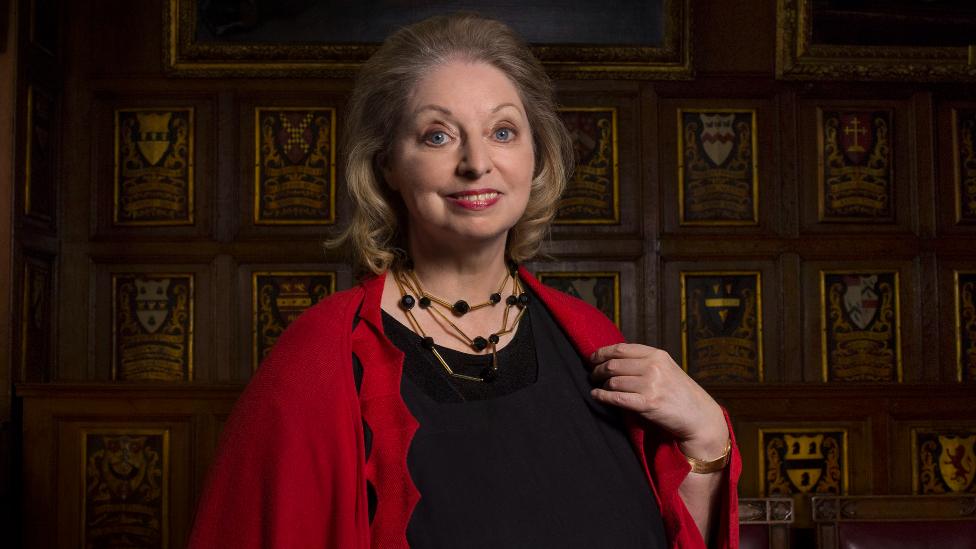Dame Hilary Mantel: Rowling, Mosse and Evaristo lead tributes to late author
- Published
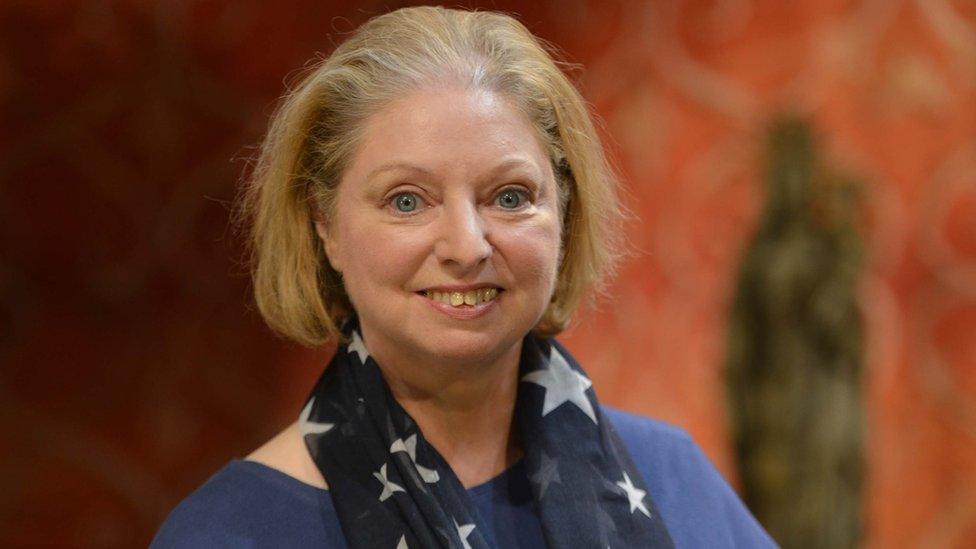
Kate Mosse said Dame Hilary (pictured) was "a classic writer, but living in our modern times"
Authors JK Rowling, Kate Mosse and Bernardine Evaristo have led the tributes to Dame Hilary Mantel, saying she changed the face of literature.
Dame Hilary, author of the best-selling Wolf Hall trilogy, died on Thursday aged 70, her publisher confirmed.
She won the Booker Prize twice, for 2009's Wolf Hall, the first in the Thomas Cromwell series, and its 2012 sequel Bring Up the Bodies.
"We've lost a genius," tweeted Harry Potter writer Rowling, external.
The president of the Royal Society of Literature, Evaristo said, external she was "so sorry" to hear the news and that she felt "so lucky to have such a massive talent in our midst".
"I met her a few times and she was always so warm, down-to-earth and welcoming. RIP," the fellow Booker Prize-winning author said.
Speaking to BBC Radio 4's The World at One programme, Labyrinth author and founder of the Women's Prize for Fiction, Kate Mosse, said Dame Hilary "changed the face of how modern readers saw historical fiction".
"She was a very great writer... she kind of just had this exquisite way of capturing a place in a time within three sentences," Mosse said.
Pointing to her other, earlier works, Beyond Black and Everyday is Mother's Day, as well as her "searing" memoir, Giving Up the Ghost, Mosse went on to describe Dame Hilary as "a writers' writer" who "became one of the most important readers [that] writers could have".
Mosse continued: "The thing about Hilary Mantel was that she was a woman of extraordinary principle, she said what she thought, she wrote what she thought, she believed in the idea that your writing was your soul, if you like, out there.
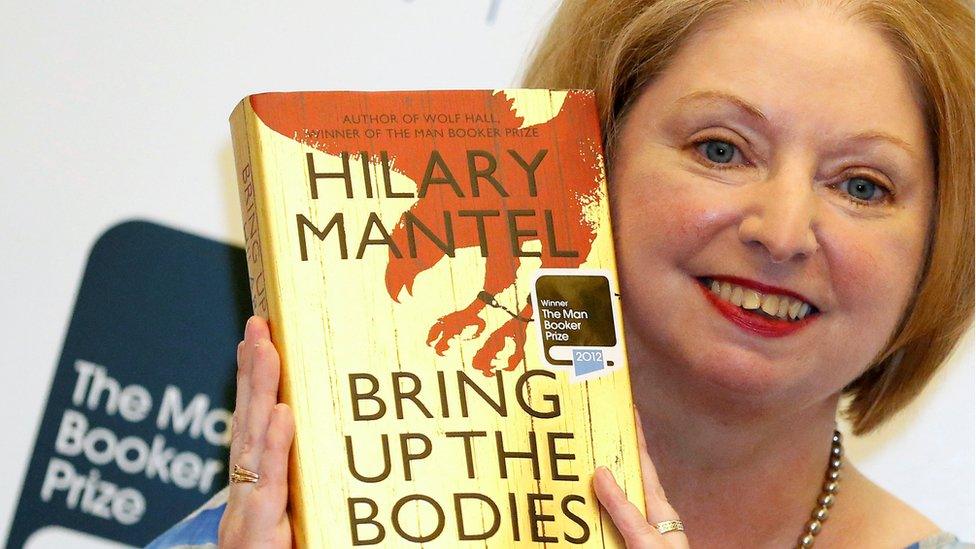
Dame Hilary won the Booker Prize twice, for Wolf Hall and Bring Up The Bodies
"And she was unaffected by whether these views were popular or they were out of fashion, or she should do this or she should do that."
Mosse concluded: "She was a classic writer, but living in our modern times, and she will be remembered like George Eliot and [Charles] Dickens - I have no doubt that her works will never go out of print."
Bill Hamilton, Dame Hilary's agent at literary agency A.M. Heath, told the same programme that her work, in both historical and contemporary fiction, always gave "a sideways look, the sense always that the present was a place of complete uncertainty and danger that you never knew what was around the corner".
"I think that sense of what lay in the Gothic, which was a kind of other universe lurking just slightly behind what you saw, infuses almost everything that she writes," he said.


I was lucky enough to interview Hilary Mantel many times.
I say lucky, because in person she was charming, polite and thoughtful.
On the page, however, she could be forthright, fierce and irreverent.
What strikes me most is the range of her work. From performing psychics in suburbia in Beyond Black, to an 18th Century Irish giant in The Giant and 800 pages on the French Revolution in A Place of Greater Safety.
She was an intense and troubling writer and her subjects were odd and unpredictable. That made her work difficult to categorise and helps explain why she did not enjoy a wide readership until the success of Wolf Hall transformed her sales and profile.
People loved the idea, she told me, that she had become "an overnight success".
But she confessed that made her "feel a little bit sulky because I'd think, I've been writing since I was 22. I wrote for 12 years before I was published."
She leaves behind a body of work that I have no doubt will be read for years to come.

The influential late author delivered the BBC Reith Lectures in 2017 and spoke herself about the power of art in bringing historical figures to life.
"As soon as we die, we enter into fiction," said Dame Hilary. "Just ask two different family members to tell you about someone recently gone and you'll see what I mean.
"Once we can no longer speak for ourselves, we are interpreted. And when we remember, as psychologists so often tell us we don't reproduce the past, we create it."
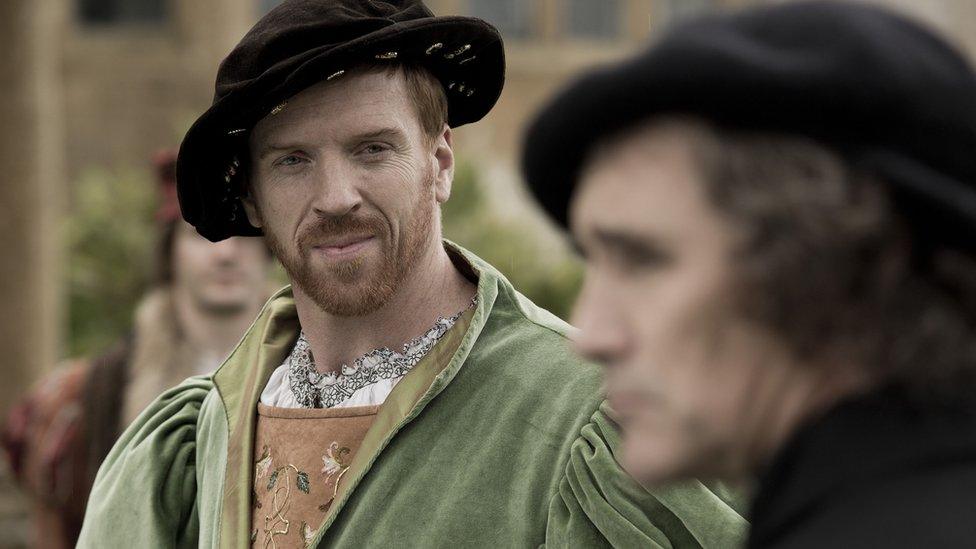
Damian Lewis as Henry VIII in the BBC TV adaptation of Wolf Hall
Dame Hilary's career-defining Wolf Hall was a fictional account of Thomas Cromwell's rise to power in the court of Henry VIII.
The third and final book in the series, The Mirror and the Light, was published in 2020 to much critical acclaim, became a fiction best-seller and was longlisted for The Booker Prize 2020.
The trilogy sold more than five million copies globally and has been translated into 41 languages.
Wolf Hall and its sequel Bring Up The Bodies were turned into a six-part BBC TV series starring Sir Mark Rylance as Thomas Cromwell, Damian Lewis as Henry VIII and Claire Foy as Anne Boleyn.
The two books were also adapted for the stage and enjoyed a run in London's West End, as did a 2021 adaptation of the third novel in the trilogy, The Mirror and the Light.
Actor and playwright Ben Miles, who helped Dame Hilary bring her work to the stage, described her as "an extraordinary woman", as well as "a good friend and a close colleague".
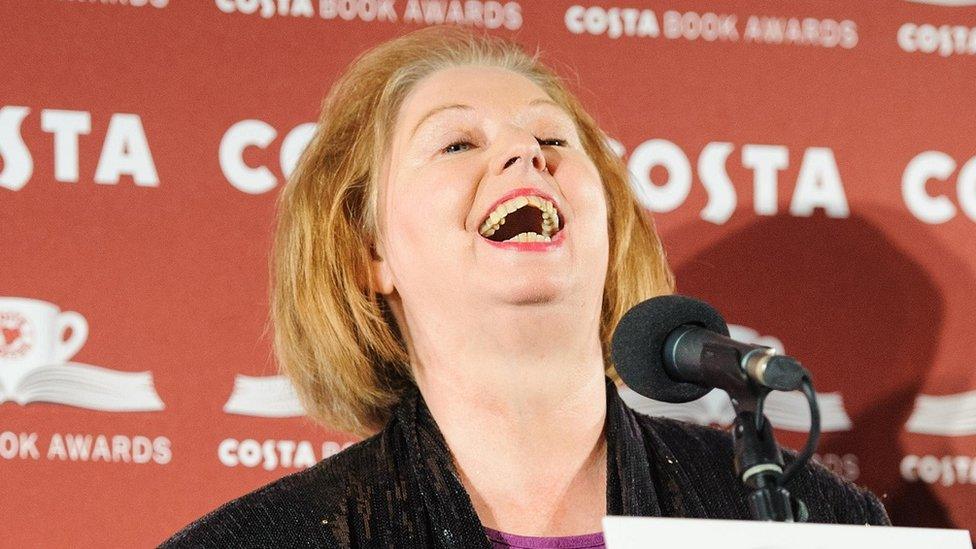
She won the Costa Book of the Year Award in 2013 for Bring up the Bodies
"I feel so honoured to have known her and to have contributed in a small way to the work of one of the greatest writers of our time," he told the BBC on Friday.
"I shall dearly miss her kindness, her humour and her gentle tenacity. The indisputable genius of her words remains as some small consolation to this tragic loss."
Writing on Twitter, Author Damian Barr said:, external "With every book she redefined what words can do.
"She's the only person I ever interviewed that speaks in whole, flawless paragraphs. I can't believe we won't have another book from her. Thinking of her family and friends. Such a loss."
Historian Simon Schama tweeted:, external "Shattered to learn of death of Hilary Mantel - one of the very greatest of our writers; poetic and profound prose with an incomparable feel for the texture of history."
Peter Kosminsky, who directed the BBC adaptation of Wolf Hall, told Radio 4's PM programme: "It's a terrific shock.
"I can't help feeling that a light has gone out in our rather rather benighted country. Hilary Mantel was an expert, she spent five years researching Cromwell and the Tudor period before she even put pen to paper. She was erudite on a range of subjects."
"For those who knew her, for her husband Gerald, and all those who adored her books, we're not going to see her like again in our lifetimes."
Related topics
- Published23 September 2022
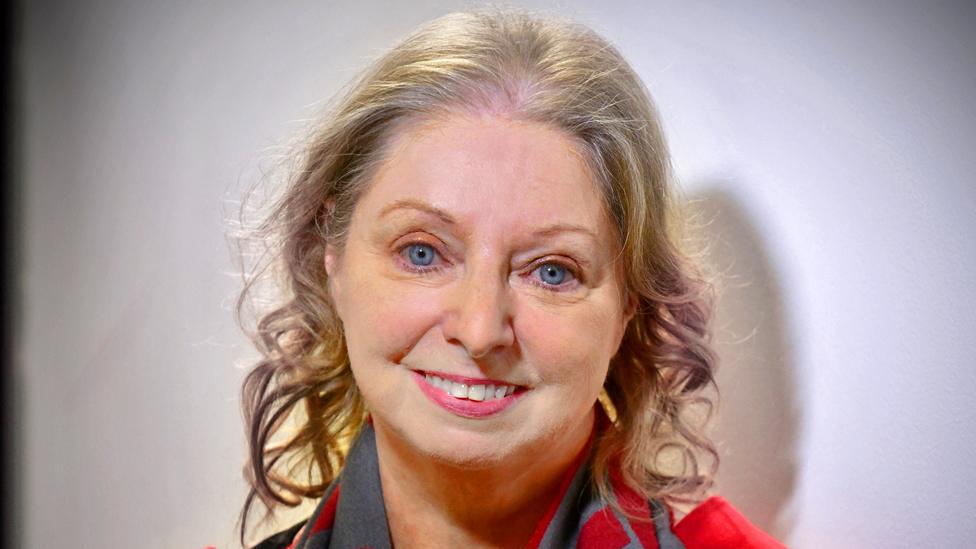
- Published24 September 2022
